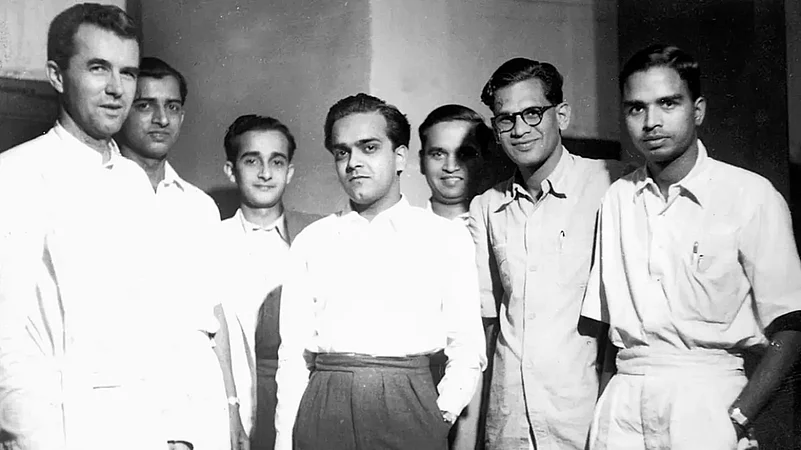With Independence 75 years ago, India stepped into a new era with its own enormous challenges. Apart from meeting the basic needs of food, clothing and healthcare, India needed to grow its economy to become the welfare state envisioned in the Constitution. The founding fathers knew that education was the only way the fledgling nation could achieve her true potential and that only education could drive future growth. Primary education was both a basic need and a fundamental right, yet higher education and specialised education focussed on nation-building was the need.
Without exaggeration, one of the biggest agents of this drive towards educating India has been the Society of Jesus. Known, admired and loved all over the world as the Jesuits, the Society of Jesus is a Christian Religious Order that has played a stellar role in spreading quality education far and wide in India.
If we are to talk numbers, in India, the Society of Jesus has founded 118 Primary and Middle Schools, 220 High Schools, 58 University Colleges, 22 Technical Institutes, 2 Universities and 17 Business Administration Institutes. Almost all of these are among India’s most reputed – St. Xavier’s, Calcutta, Mumbai, Ranchi; Loyola, Chennai, Vijayawada; St. Joseph’s, Bangalore, Delhi NCR, Trichy, St Xavier & XIM Universities and of course XLRI, Jamshedpur. Collectively, these institutions employ 11,525 teachers, and are educating 3,34,538 students every year, across social classes, communities and linguistic groups.
If these numbers seem unbelievable to the reader, just one word will set all doubts aside. And that is ‘Xavier’s’. All Xavier’s institutes are run by Jesuits, and are named after Francis Xavier, disciple of Ignatius of Loyola, the founder of the Society of Jesus. Across India, the word ‘Xavier’s’ has come to mean quality education, all-round personal growth and a legacy to be proud of. The word has become synonymous with achievement and the hope of a better future.
India occupies a core place for the Order - it is here that Ignatius of Loyola sent Francis Xavier. He worked in India from 1542 to 1552 - the Xaverian decade. This laid the foundations for the premier institutions of India today. St. Francis Xavier opened the first Jesuit institution in Goa in 1543, St. Paul’s College. While today St. Paul’s is nothing more than a historical record, it was the predecessor of the hundreds of educational institutions being run by the Jesuits.
Founded in 1540, the Society of Jesus has been active in the field of education globally – running 3,897 educational institutions across 96 countries. These Jesuit Educational Institutions engage the efforts of approximately 1,34,303 teachers, educating approximately 29,28,806 students worldwide.

Interestingly, education does not have any special status in the Order’s Constitution. However, Jesuits are synonymous with education and are reputedly among the world’s best educators. Everywhere and anywhere in the world, a Jesuit institution delivers quality secular education in an atmosphere that aids character formation and lays the foundation for moral values and integrated development.
What is it about Jesuit educational methods that sets them apart? The answer lies in the Order’s spirit that underlines their every effort. First, Jesuits have an incomparable willingness to use any branch of human knowledge, modern languages, philosophy, theology, medicine, law, media and every branch of science and technology – Jesuit education entertains no concept of taboos. Second, it lays stress on character- building and a sense of discipline along with the development of free thinking. Third comes the continual drive towards self-improvement, by stretching talents and abilities. Ambition and individual achievement are stimulated and rewarded while teamwork is encouraged.
Compulsory in a Jesuit education is the development of the moral and intellectual qualities of leadership: love for country, integrity, human relations, understanding, hard work, organisational ability, cooperation and teamwork, and the power of expression in speech and writing.
A Jesuit institution aims to form “men and women for others” - agents of change for their families, communities and countries. Jesuits view their work as “the service of Faith in God and the promotion of Justice in the world”. To this end, they offer preferential treatment to economically poor students in terms of financial and academic support.
What is it that keeps the Jesuits going? Probably, the Order’s “humanism” – its steadfast refusal to condemn anything that is human – and its willingness to use all human knowledge and achievements in the service of God and people. Another Jesuit characteristic is flexibility and the willingness to adjust. Jesuits are taught to be rigid and uncompromising only when it comes to sin. Another distinguishing feature is the way Jesuits combine stern inner discipline with maximum freedom for each individual member in external life and in the choice of methods. Finally, there is a certain typical thoroughness in all that is undertaken. This is expressed by the frequent use of the word magis, “greater”, “higher” “More” in relation to the goals the Jesuits, as individuals and as a community, strive for. Their age-old maxim is to aim at the greater good for the greater number of people.
Jesuit institutions aim to help students become mature, spiritually-oriented individuals of character; to encourage them continuously to strive for excellence; to value and judiciously use their freedom; to be clear and firm on principles and courageous in action; to be unselfish in service of fellowmen; to become agents of necessary social change. Each Jesuit institution works to transform society for the better. The causes of social justice, equality of opportunity, genuine freedom, and respect for religious and moral values are sacrosanct to those in the Order.
In India, the Society of Jesus has focussed on establishing management institutes – they felt that the needs of a new nation were best met by creating a cohort of professionals with world-class management education. Starting with XLRI in Jamshedpur, they established one management institute after another.
XLRI is one of the biggest examples of Jesuit spirit, endeavour and achievement. The spirit of Magis- ‘Greater’ in Latin – serves as its foundational bedrock. XLRI has always worked towards building a just and humane society. The institution recognised early on the need to create thought leaders who would build the country, brick by brick, idea by idea, plan by plan.
There is no doubt that through their immeasurable contributions to education, the Society of Jesus in India can rightly be called one of the architects of the India we know today.






















